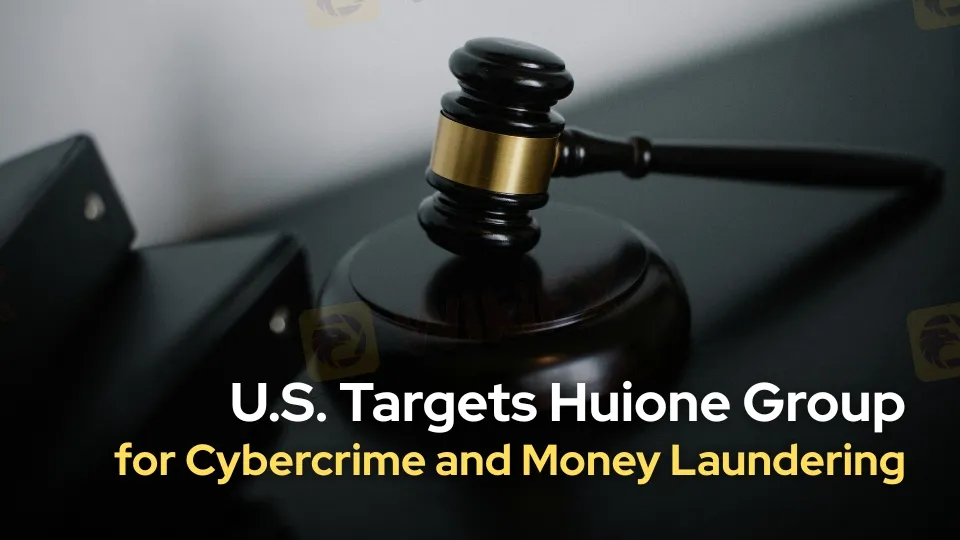简体中文
繁體中文
English
Pусский
日本語
ภาษาไทย
Tiếng Việt
Bahasa Indonesia
Español
हिन्दी
Filippiiniläinen
Français
Deutsch
Português
Türkçe
한국어
العربية
U.S. Treasury Targets Cambodia’s Huione Group for Cybercrime Money Laundering
Abstract:U.S. Treasury targets Huione Group for laundering $4B in cybercrime funds, including North Korea’s Lazarus Group scams, to disrupt global illicit finance networks.

The U.S. Treasury Department has taken significant action against Cambodia-based Huione Group, accusing it of facilitating billions of dollars in illicit financial transactions tied to cybercrime and online scams. A recent move by the Treasury's Financial Crimes Enforcement Network (FinCEN) seeks to block Huione from the American financial system, citing its role in laundering funds for global criminal syndicates, including North Koreas Lazarus Group.
The Treasury plans to call Huione a “major money laundering problem.” This would stop U.S. banks from working with the company. Reports say Huione handled over $4 billion in dirty money from August 2021 to January 2025. Of this, $37 million in digital currency came from North Korean cyberattacks, and $36 million was from “pig butchering” scams, where fraudsters trick people with fake love or investment offers.
Treasury Secretary Scott Bessent said Huione is a go-to place for bad actors, including North Korean groups and other criminals. This shows the rising worry about how digital money, cybercrime, and global fraud connect.
The Treasurys plan includes a 30-day period for public feedback before the rule is final. If approved, Huione would lose access to U.S. dollar services, which would hurt its ability to work with global banks. This could greatly limit its operations.

FinCEN‘s plan builds on Reuters reports that Huione Pay, a payment arm of the group, got over $150,000 in digital currency from a wallet tied to Lazarus hackers between June 2023 and February 2024. Huione Pay said it didn’t know the wallet was linked to Lazarus and claimed it didnt control it.
Digital currency is a key way for North Korea to dodge global sanctions, letting it buy restricted items. The United Nations has noted how North Korea uses these methods to fund its activities.
In January 2025, Huione launched its own digital coin, USDH, and a private chat service to rely less on apps like Telegram and Tether. Before this, Huione used Tether (USDT) for most of its deals. In July 2024, Tether froze a Huione Pay account after it was tied to money stolen by Lazarus. At least $14 million of that was from a $300 million hack of Japans DMM Bitcoin exchange in June 2024.
Huiones USDH coin is a way to avoid problems with outside services like Tether. This unregulated coin helps Huione hide its transactions and keep supporting illegal acts.
Elliptic, a top blockchain research firm, said Huione‘s marketplace offers illegal services like cleaning money, selling stolen personal information, and tools for big online scams. Its vendors reportedly work from Cambodia’s Golden Fortune Science and Technology Park, a place tied to forced labor and human trafficking, with victims from Vietnam, Malaysia, and China.
Elliptic also found that some Huione vendors sold electric shackles, likely used in human trafficking. Since starting in 2021, Huione has moved at least $11 billion through digital wallets, with most of it likely tied to illegal activities, according to Elliptic.
As the U.S. Treasury pushes its rules, the focus on Huione shows the tough fight against cybercrime, money laundering, and online scams in the global financial world. This case reminds us how digital currencies are still used by criminals to take advantage of weak spots in the system.

Disclaimer:
The views in this article only represent the author's personal views, and do not constitute investment advice on this platform. This platform does not guarantee the accuracy, completeness and timeliness of the information in the article, and will not be liable for any loss caused by the use of or reliance on the information in the article.
Read more

Thinking of Investing? Read Must-Know Facts About Funding pips!
When you check the internet for Funding Pips, you'd be surprised to know it's filled with praise for Funding Pips but often lacks the real facts that traders need. Everything that seems too good to be true should always be verified first. It could be Fraud . So, we conducted research and collected several facts you must know about Funding Pips.

OctaFX Back in News: ED Attaches Assets Worth INR 134 Cr in Forex Scam Case
The Enforcement Directorate (ED) in Mumbai has attached assets worth around INR 131.45 crore. This included a luxury yacht and residential properties in Spain. Read this interesting story.

Oil Prices Stay Firm on Solid US Jobs Data
Oil prices stayed firm this week as the US labour department posted a better-than-expected payroll data in June 2025. Read this news in detail.

Truth About Angel One – Here’s What You Need to Know
Thinking about investing in Angel One? Wait! Know the essential things about the broker before Invest. It could be SCAM. Read, think, and invest .
WikiFX Broker
Latest News
CFD Brokers Face Dual Compliance Pressures Ahead of 2026: Australia and EU Tighten Rules
Services Surveys Signal 'Expansion' In June, Inflation Fears Remain High
Major Risks Associated with AuxiliumFX: You Need to Know
ASIC cancels AFS licences of Ipraxis and Downunder Insurance Services
CFI Financial Group Becomes Official Online Trading Partner of Etihad Arena
FxPro to Launch Crypto Trading Desk, Deepening Digital Asset Push
Global Brokers Vs. Indian Rules: Why They Struggle in India
Discover 5 Benefits of Trading with Trive FX Broker
Indian regulator bars U.S. firm Jane Street from accessing securities market, impounds $566 million in manipulation probe
Asia-Pacific markets trade mixed ahead of Trump's deadline for higher tariffs
Currency Calculator


